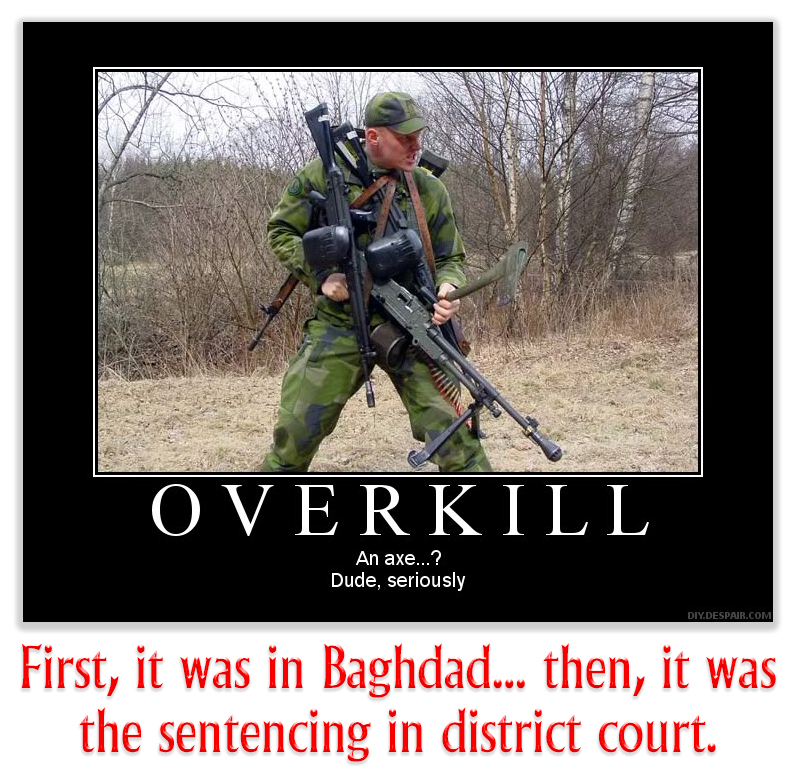We post news and comment on federal criminal justice issues, focused primarily on trial and post-conviction matters, legislative initiatives, and sentencing issues.
TWO INTERESTING D.C. CIRCUIT RULINGS END LAST WEEK
The D.C. Circuit handed down a pair of rulings last Friday. One, the reversal of sentences (and in one case, a conviction) for four Blackwater contractors over a 2007 Baghdad massacre, was widely reported. The other, a case about prisoners’ waivers of FOIA rights, flew under the radar. Both are of significance to federal inmates.

D.C. CIRCUIT SAYS 924(C) SENTENCE IN BLACKWATER CASE VIOLATES 8TH AMENDMENT
 The big news from the D.C. Circuit last Friday was the reversal of sentences for four Blackwater private security contractors who massacred 14 civilians after they mistakenly thought they were under attack on a Baghdad street. Buried in that decision is a holding of interest to federal prisoners with 18 USC 924(c) convictions, especially where those counts are stacked to result in horrendous sentences.
The big news from the D.C. Circuit last Friday was the reversal of sentences for four Blackwater private security contractors who massacred 14 civilians after they mistakenly thought they were under attack on a Baghdad street. Buried in that decision is a holding of interest to federal prisoners with 18 USC 924(c) convictions, especially where those counts are stacked to result in horrendous sentences.
The contractors were armed with government-issued M4 rifles, which of course can be set to fire fully automatically. Because of that, each of the defendants – found guilty of committing a crime of violence with a gun – got a mandatory sentence of 30 years because the weapon was a machine gun.
Apparently, hanging the 924(c) machinegun sentence on the defendants was contentious, even in the Justice Department. The D.C. Circuit agreed, ruling that applying the mandatory 30-year sentence to the contractors – based “solely on the type of weapons… used – violated the 8th Amendment’s prohibition against cruel and unusual punishment.
In its opinion, the Circuit tried mightily to limit the decision to the facts of the case: It notes the firearms were a type required by the government, the contractors all had prior unblemished military records and no other convictions, it was a war zone where snap judgment was the difference between life and death, the contractors did not choose to be on that street corner, but were ordered there by their commander, and they did not set out that day to blow away civilians. The Court also noted that when 924(c) was last amended, the concept of private contractors protecting U.S. diplomats was not envisioned.
 “Combining all of these considerations,” the appellate court said, “we conclude the mandatory 30-year sentences create the rare case that leads to an inference of gross disproportionality… None of the penological justifications our society relies upon when sentencing criminals — incapacitation, rehabilitation, retribution, or deterrence — are properly served here by a sentence whose length is determined solely based on the type of weapon used during the crime.”
“Combining all of these considerations,” the appellate court said, “we conclude the mandatory 30-year sentences create the rare case that leads to an inference of gross disproportionality… None of the penological justifications our society relies upon when sentencing criminals — incapacitation, rehabilitation, retribution, or deterrence — are properly served here by a sentence whose length is determined solely based on the type of weapon used during the crime.”
The Blackwater case has a rare set of facts, and run-of-the-mill defendants – who, for example, use a submachine gun to rob a bank – are unlikely to get much love from the holding. However, now the 8th Amendment camel’s nose is inside the tent. It will be interesting to see whether 8th Amendment claims become a staple of 924(c) defense elsewhere in the country.
United States v. Slatten, Case No. 15-3078 (D.C.Cir., Aug. 4, 2017)

D.C. CIRCUIT SAYS FOIA RIGHTS CANNOT BE WAIVED BY PLEA AGREEMENT
The government often demands, as a price for plea agreements, that defendants waive their right to pursue Freedom of Information Act requests.
Last Friday, the D.C. Circuit outlawed the practice, holding that the FOIA waiver is unconnected to any “legitimate criminal justice interest” and is void as a matter of public policy.
 The Court said a “prosecutor is permitted to consider only legitimate criminal justice concerns in striking a plea bargain—concerns such as rehabilitation, allocation of criminal justice resources, the strength of the evidence against the defendant, and the extent of a defendant’s cooperation with the authorities… This set of legitimate interests places boundaries on the rights that can be bargained away in plea negotiations.”
The Court said a “prosecutor is permitted to consider only legitimate criminal justice concerns in striking a plea bargain—concerns such as rehabilitation, allocation of criminal justice resources, the strength of the evidence against the defendant, and the extent of a defendant’s cooperation with the authorities… This set of legitimate interests places boundaries on the rights that can be bargained away in plea negotiations.”
While banning FOIA suits “may occasionally promote the government’s legitimate interest in finality,” the Circuit said, “they only do so by making it more difficult for criminal defendants to uncover exculpatory information or material showing that their counsel provided ineffective assistance. That argument takes the finality interest too far. After all, a defendant can never waive his right to bring a colorable claim of ineffective assistance of counsel, even though such claims undermine finality… FOIA plays a significant role in uncovering undisclosed Brady material and evidence of ineffective assistance of counsel, and in practice has led to uncovering records relevant to ineffective-assistance-of-counsel claims, such as plea offers not communicated by defense counsel to clients.”
Price v. Dept. of Justice Attorney Office, Case No. 15-5312 (D.C.Cir., Aug. 4, 2017)
– Thomas L. Root

